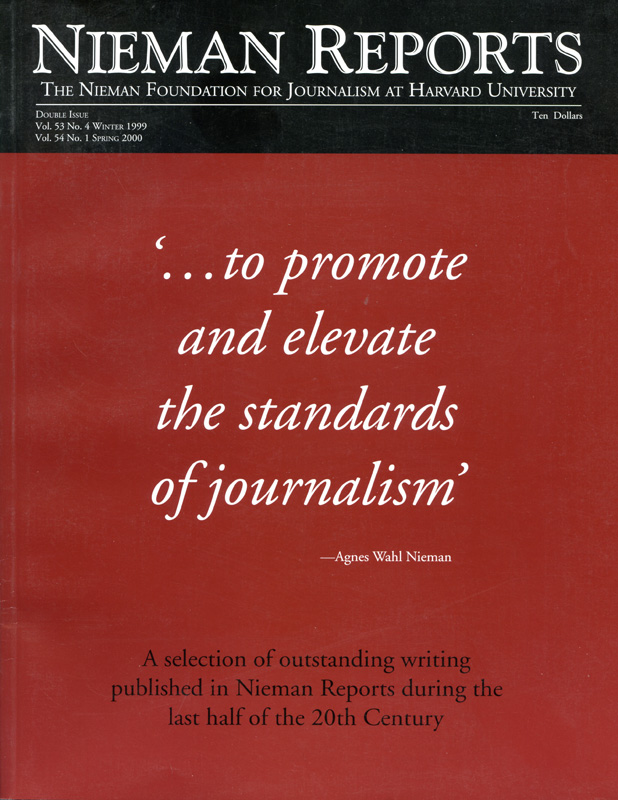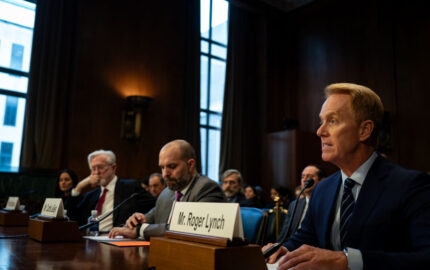
Commemorative Double Issue
What you [see] here is a collection which reflects the substance of the first 53 years of the conversation journalists have engaged in about their rights and responsibilities in the pages of Nieman Reports. At times you will find an article that opened a new argument or ended an old one. Throughout you will hear the voices of journalists committed to their work challenging colleagues to raise the standards of discovering, reporting, writing and editing the news in a context meaningful for navigation within a free society. – Bill Kovach
[This article originally appeared in the April 1952 issue of Nieman Reports.]
The two main ways to communicate ideas in America are by press and radio. I’ve communicated with America both ways. I’ve found freedom of speech in the American press. I’ve found an immovable, frightening Iron Curtain in American radio and TV.
In Communist Russia, you think like the Kremlin thinks, or you’d better stop thinking—out loud, at least. On the American air, you think like your sponsor thinks—or he finds someone else who does.
That is why all the thinking that comes out of TV and radio—both from the frankly commentary and opinion programs—and the concealed “messages” in the entertainment shows represent the thinking of a small group of Americans—the group that sells the whisky and the girdles and the body odor glorifiers—just as all the thinking on Soviet radio represents the thinking of another small group in the Kremlin.
Now I think that minorities should have a voice. I am prepared to fight to the death for the rights of the men who make whisky or girdles or banish unpleasant smells—but I think us majorities have some rights, too.
In radio, the majority of Americans long ago exercised the one right we had left—the right not to listen.
I have every confidence that the unbeatable team of network and sponsor will make TV just as unbearable.
They are mighty proud when they have succeeded in getting five million sets turned into one show, instead of being ashamed that they’ve succeeded in getting 20 million sets turned off. The great idiocy of air surveys is that they rate only the preferences of the people who are listening. They neglect to find out why more millions, who have invested fortunes in their sets, have rearranged their living rooms to accommodate ’em, who are desperate for decent entertainment, honest news shows, and yet who have been so bored, sickened and offended by the muck that comes out of their machines, that they turn the damned thing off and read “Li’l Abner” instead.
After the Democratic primaries in New Hampshire, TV can no longer plead that it is merely an entertainment medium—and therefore has no responsibility to the nation—but only to the whisky distillers or the girdle architects. TV has demonstrated its impact on American thinking by creating a widely popular presidential candidate out of a heretofore obscure Senator from Tennessee, who, because of a few appearances on TV, was able to beat the pants off the President of the United States and the regular Democratic political machine.
TV, whether the men who run it like it or not, has become, along with the press, the most powerful means of communication (and therefore influence) in the United States. With power comes responsibility. The American press has by and large shouldered that responsibility. No advertisers can buy the editorial columns of any great American newspaper. Any advertiser can buy the editorial influence of any great American network, by buying time and making sure that the commentator who uses the time is their own obedient baby boy.
In this way, a tiny minority of national advertisers control most of our network time and can, and do, pull an Iron Curtain down between the public and any views but their own.
It’s dangerous—it’s un-American. We don’t want our thinking dictated to us, shaped for us, by any small group of commissars, either from the Kremlin or from the promotion department of a soap factory. It is up to the networks to realize, no matter how uncomfortable the idea is, that in TV they have one of the most powerful media of influence and that this power must be used for all America, not just their sponsors.
Now the networks have every right to make a buck. It would be, in my opinion, disastrous for us to give control of TV to government. The air should remain, like the press, the property of private enterprise.
But, like the press, the air should be run in an American way—it mustn’t, like Russian air, be the property of a small group. It should, like the American press, keep its influence a clean and unpurchasable influence. TV should remain a business—but a business as great in its dignity and honesty as it is in its influence, not a shabby, unprincipled racket that is willing to sell itself—and us—for 30 pieces of silver.
Well, I guess you won’t be seeing me on any TV shows after this. At any rate, I’ll still be seeing you in the funny papers.
This provocative statement by the cartoonist Al Capp was heard on March 12 by a Boston audience of several hundred.
The two main ways to communicate ideas in America are by press and radio. I’ve communicated with America both ways. I’ve found freedom of speech in the American press. I’ve found an immovable, frightening Iron Curtain in American radio and TV.
In Communist Russia, you think like the Kremlin thinks, or you’d better stop thinking—out loud, at least. On the American air, you think like your sponsor thinks—or he finds someone else who does.
That is why all the thinking that comes out of TV and radio—both from the frankly commentary and opinion programs—and the concealed “messages” in the entertainment shows represent the thinking of a small group of Americans—the group that sells the whisky and the girdles and the body odor glorifiers—just as all the thinking on Soviet radio represents the thinking of another small group in the Kremlin.
Now I think that minorities should have a voice. I am prepared to fight to the death for the rights of the men who make whisky or girdles or banish unpleasant smells—but I think us majorities have some rights, too.
In radio, the majority of Americans long ago exercised the one right we had left—the right not to listen.
I have every confidence that the unbeatable team of network and sponsor will make TV just as unbearable.
They are mighty proud when they have succeeded in getting five million sets turned into one show, instead of being ashamed that they’ve succeeded in getting 20 million sets turned off. The great idiocy of air surveys is that they rate only the preferences of the people who are listening. They neglect to find out why more millions, who have invested fortunes in their sets, have rearranged their living rooms to accommodate ’em, who are desperate for decent entertainment, honest news shows, and yet who have been so bored, sickened and offended by the muck that comes out of their machines, that they turn the damned thing off and read “Li’l Abner” instead.
After the Democratic primaries in New Hampshire, TV can no longer plead that it is merely an entertainment medium—and therefore has no responsibility to the nation—but only to the whisky distillers or the girdle architects. TV has demonstrated its impact on American thinking by creating a widely popular presidential candidate out of a heretofore obscure Senator from Tennessee, who, because of a few appearances on TV, was able to beat the pants off the President of the United States and the regular Democratic political machine.
TV, whether the men who run it like it or not, has become, along with the press, the most powerful means of communication (and therefore influence) in the United States. With power comes responsibility. The American press has by and large shouldered that responsibility. No advertisers can buy the editorial columns of any great American newspaper. Any advertiser can buy the editorial influence of any great American network, by buying time and making sure that the commentator who uses the time is their own obedient baby boy.
In this way, a tiny minority of national advertisers control most of our network time and can, and do, pull an Iron Curtain down between the public and any views but their own.
It’s dangerous—it’s un-American. We don’t want our thinking dictated to us, shaped for us, by any small group of commissars, either from the Kremlin or from the promotion department of a soap factory. It is up to the networks to realize, no matter how uncomfortable the idea is, that in TV they have one of the most powerful media of influence and that this power must be used for all America, not just their sponsors.
Now the networks have every right to make a buck. It would be, in my opinion, disastrous for us to give control of TV to government. The air should remain, like the press, the property of private enterprise.
But, like the press, the air should be run in an American way—it mustn’t, like Russian air, be the property of a small group. It should, like the American press, keep its influence a clean and unpurchasable influence. TV should remain a business—but a business as great in its dignity and honesty as it is in its influence, not a shabby, unprincipled racket that is willing to sell itself—and us—for 30 pieces of silver.
Well, I guess you won’t be seeing me on any TV shows after this. At any rate, I’ll still be seeing you in the funny papers.
This provocative statement by the cartoonist Al Capp was heard on March 12 by a Boston audience of several hundred.


